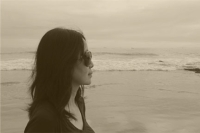Monkey Bridge
Excerpt
My eyes smarted from the chill of the brisk evening air as, patch by patch, I scanned the road ahead for barbed wire or barricades. But the road was unscarred; no army trucks had ripped the dirt open with their giant wheels. At the far end of the horizon, past the checkpoint booths, I saw an anarchy of untamed, foreign signs and arrows, some pointing toward Quebec, others toward Ontario – all places I had never been.
The sun cast an unsteady red across the sky. I couldn’t tell how many hours we had passed, hunched in the bunkered metal enclosure of Bobbie’s Chevy, watching a uniformed man tap specks of cinder from his cigarette like red warning lights flashed into the dusk of winter. Bobbie had received her driver’s license a mere week before, and already we were making full use of it. We had been driving since her parents left for their Florida vacation this morning, and were actually hundreds of miles from Virginia and from my mother. A maple-leaf flag painted on a mailbox, an imaginary line across the dark stretch of highway. These became frightening things suddenly. I peered over the dashboard across the unfortified boundary, and, just like my mother had she been with me instead of in a hospital bed in Virginia, I could see only danger looming in the land, over there.
Keep calm. Everything will be all right. Hadn’t Canada offered shelter and refuge for those who sought release from war? Wasn’t Canada safety itself, a neutral space unimplicated by the American embargo of Vietnam – the nearest place where telephone connections to Vietnam allowed me to take a wild chance and locate my grandfather?
“All we have to do is cross the border and you’ll be able to call Baba Quan. Just like that,” Bobbie said. There, on a piece of paper, was my grandfather’s telephone number in Ba Xuyen, which I had found penciled in my mother’s address book in her bedside table.
***
One breath in, one breath out. Sit still. Things will fall together. I felt a tightening in my chest. The Americans, rumors had it, could forbid us to return if we stuck so much as half a foot outside the perimeters of their country.
My mother’s voice churned inside my head, reminding me of the powerful grip her views still had on me. “They’d jump at the chance to send us all back. Nomads, that’s what we’ve all become.”
Besides, I knew from my own reading that refugees were a burden to the economy. Hadn’t our local paper warned of the consequences when thousands of Indochinese began settling in Virginia in 1975? We were, after all, a ragtag accumulation of unwanted, an awkward reminder of a war the whole country was trying to forget.
Bobbie had parked the car at an outdoor rest stop, the last service center on the American edge of the border. We were waiting for, I couldn’t exactly say – for a miracle to heal me of fear. But the vast vacant sky was shrinking fast, closing in on us like the gray metallic roof of an airless bomb shelter sunk deep inside the earth. The sun, dull and splattered like a burnt yolk, was hiding low, snagged behind a mass of clouds so thick and dull that even the lush cedar-green looked a sludgy olive. We sat silently in the car and watched the rusted orange light scuttle from one end of the windshield to the other until Bobbie couldn’t stand it any longer. Every half-hour or so she searched the radio station for Fleetwood Mac or the Eagles.
The strategy for victory is always the unexpected strategy. My impulse was to turn the car around and head south. On the other side, at the northern edge of the road, street lamps smeared splotches of light onto a clutter of snow-splattered signs: BorderPetroleum, Frontier Bar, Poulet Frit a la Kentucky. I felt the tug of my mother through my body.
Bobbie lifted her face from the steering wheel, her hands jiggling change in her pockets. “Mai?” Let’s see what we’ve got here. Quarters, nickels, dimes, the whole works. I bet we can use every one of them in those soda and candy machines they’ve got over there. The Canadians hate to hear this, but Canada’s no different from the United States.” She grinned. Her voice still sounded comforting, but even my best friend was running out of cool, rational advice. What more could she suggest once she had said things like, “They’re not going to deport you,” “You’ve got your papers,” “You’re legal,” “They can’t not let you back in”? Even her storehouse of inspirational quotes, battle cries she had picked up from her father’s Alcoholics Anonymous pamphlets, hadn’t been comfort enough for me. Easy Does It But Do It, Act Your Way into Right Thinking, Think Positive. She twisted open a Coke bottle and watched the foam rise.
I touched my green card in my jacket pocket and felt the plastic protective cover between my fingers. Even the feel of an official document did not comfort. Resident alien, I reminded myself, is just as good as citizen for purposes of crossing the Canadian border.
“Any difference you see is bound to be small. Tell yourself you’re not leaving home, just going upstairs.” She reached over and squeezed my hand.
I backed away from her touch. Right in front of our eyes, three bird droppings splattered the windshield. Through the blue-tinted glass, I could almost see the giant caterpillar treads a convoy of tanks must have made on the road, emitting gusts of red heat my father warned could blister the skin. The stretch ahead looked difficult, an eerie topography of misshapen memories and warped psychological space trapped in my mind that night.

_w200_h/family-in-six-tones(1)_08190448.jpg)